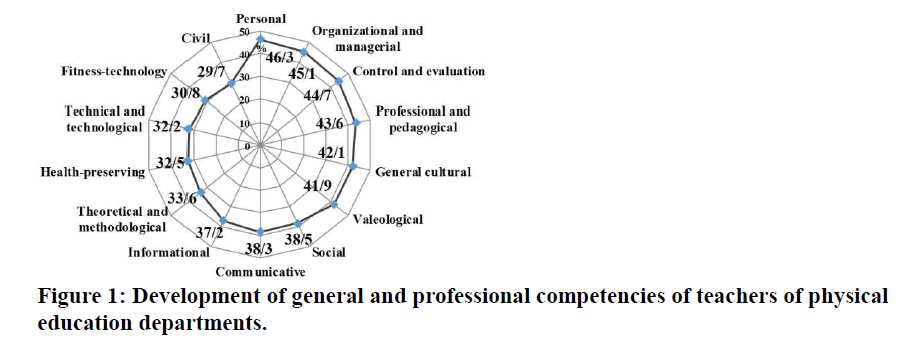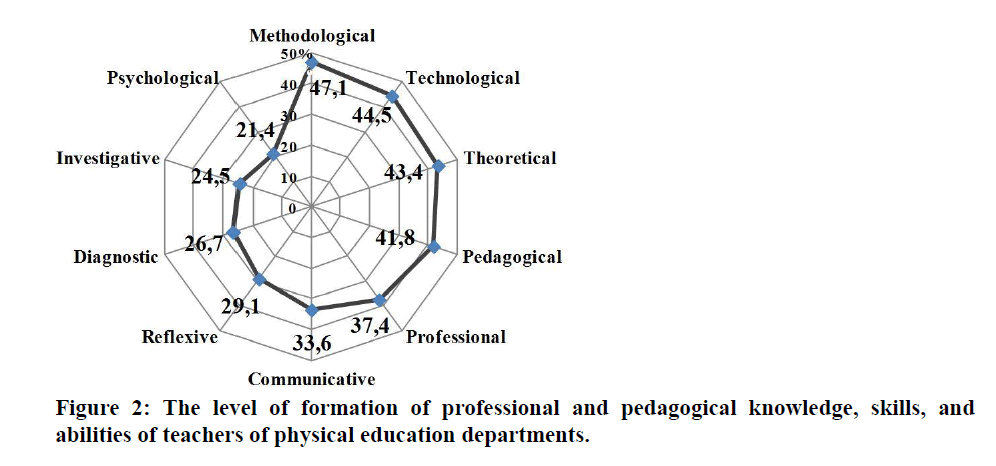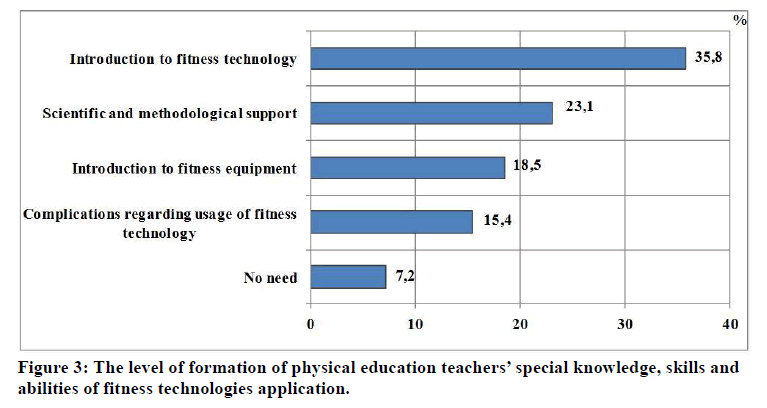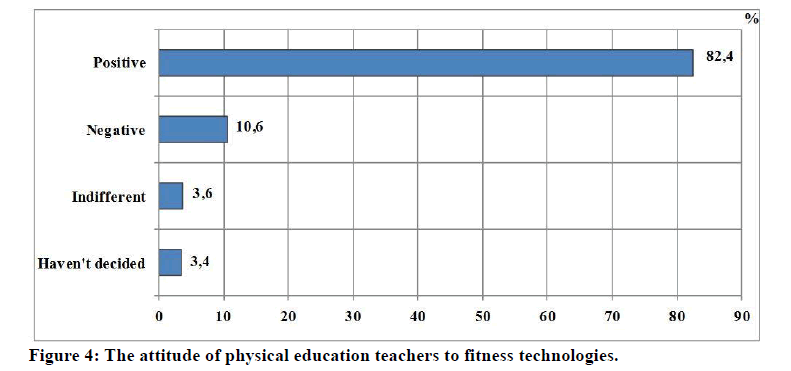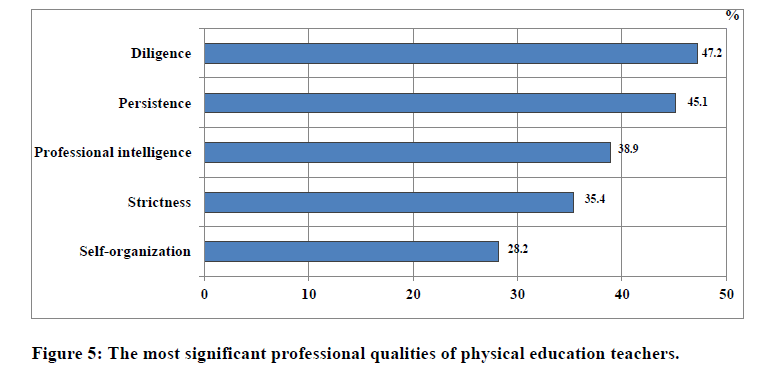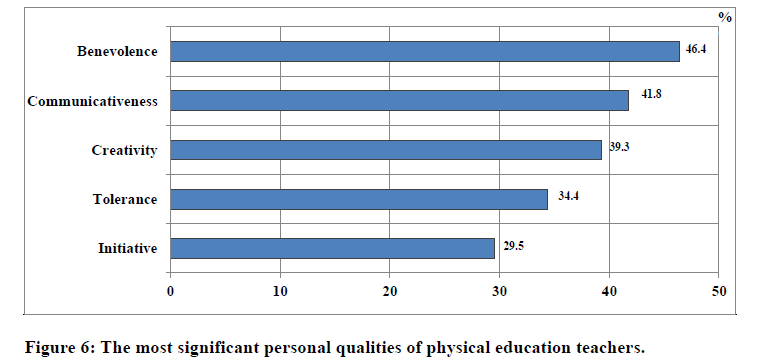Research - (2021) Volume 9, Issue 7
Investigating the Pedagogical and Psychological Features of the PE Teacherâs Activities During Mastering Fitness Technologies
Valeriy Zhamardiy1*, Olena Shkola2, Olena Kolhan3, Ruslana Padalka3 and Tetyana Kolgan4
*Correspondence: Valeriy Zhamardiy, Department of Physical Education and Health, Physical Therapy, Ukrainian Medical Stomatological Academy, Ukraine, Email:
Abstract
The growth and experimental check of the teacher's physical training activity's psychological and pedagogical features while learning fitness technologies have been conducted in this study. It can be inferred that all the competencies of physical education (PE) teachers are almost interdependent, interconnected, and part of the methodological system of using health technologies in students' educational, physical training process. Relying on their degree and the quality of their compound in the educational procedure, the teacher's professional activity style is made. To satisfy that goal, throughout the study and experimental work, a questionnaire was formed. Throughout the study and experimental work, the level of development of professional and pedagogical understanding, talents as well as capabilities of teachers of PE departments was defined. An essential reason that decreases the efficiency of a PE teacher's professional activity is the absence of special knowledge, abilities, and skills to utilize fitness technologies in the PE process. Given the launched experimental work, the necessity of physical education departments' teachers is to advance the level of formation of special knowledge, skills, and abilities associated with fitness technology. In this prevailing study and experimental work, PE departments' perspective on fitness technologies and their physical education application was examined.
Keywords
PE, Physical education teacher, Organized system, Professional competence, Students, Fitness technologies.
Introduction
Global socio-economic transformations and intensive development of the fitness industry have created the necessity for a significant number of fundamentally new tasks, which need new approaches to managing the educational process of physical education in higher pedagogical educational institutions. There is an urgent need to train a new generation of professionals, professional teachers of the third millennium, who will perfectly master modern teaching methods and be real architects of innovative fitness processes. Higher pedagogical education's essential task is the training and retraining research and teaching staff in physical education who master modern fitness technologies, combining a system of traditional training with innovation.
The use of fitness technology in physical education classes provides an opportunity to teach students on a personality-oriented approach, considering the relationship between individual disciplines and academic areas. Simultaneously, the appropriate thematic content of the educational material, its orientation, and purpose remain essential. Management of the educational process of physical education is carried out by the teacher, who determines the purpose and objectives of this process, carries out harmonious development of students, uses a system of educational methods, forms, and means of conducting classes. To achieve the goal and solve problems, as well as mastering fitness technology, a physical education teacher must have professional competence and meet a whole list of professional qualification requirements.
The problem of using fitness technology in physical education classes for students has repeatedly attracted scientists' attention. In particular, in the research of scientists, fitness technologies studied in methodological and organizational aspects. Scientists agree that fitness technology improves the quality of physical education classes in higher education establishments, meet the needs of students in improving health, contribute to the development of a positive and active attitude to a healthy lifestyle, the formation of motor skills and abilities [1-21].
Scientists consider fitness technology an essential factor in the personal development, recovery of student youth through the rational use of physical activity combined with a healthy lifestyle. The leading role of fitness technologies is to solve developmental, health, recreational, therapeutic, preventive, restorative, training, and sports tasks using various motor activity types [22-25]. Fitness technology is a new social phenomenon that consists of regular use by students of available types of organized health and recreational physical activity and moderate exercise during physical education or on their own to restore physical and mental performance, maintain health, and improve quality of life.
Materials and Methods
The study aims to develop and experimentally test the psychological and pedagogical aspects of a physical education teacher's activities while mastering fitness technologies.
For carrying out a forming pedagogical experiment on the introduction of systematic system application a control (CG) and experimental (EG) groups of students were created, which by their general characteristics and indicators of success did not differ from the general population of students of the faculties, which prepare future teachers. A representative sample of students was identified where 573 students (257 men, 316 women) were recruited to the final stage of the experiment. Ascertaining stage included conducting a pedagogical experiment aimed at researching: physical fitness, health status, morpho functional development, professionally important psychological qualities, emotional state and mental capacity of students. According to the results of the experiment's ascertaining stage, the effectiveness of training in fitness technologies as a means of physical education of students was also found out. The pedagogical experiment's formative stage involved the experimental verification of the effectiveness of the proposed methodical system. Control tests were conducted at the end of the first semester (December) and the school year (May-June). All program requirements and tests in the control and experimental groups were identical and compiled according to the physical education program's requirements. The main difference between the educational process in the experimental groups and control groups was introducing a systematic system application in students' physical education. Following theoretical methods were used: study and analysis of scientific, pedagogical, philosophical, systematic literature, curricula, curricula documents; synthesis; generalization. Empirical methods include observation, method of system analysis, method of comparison, method of functional-structural analysis.
Results
A physical education teacher's professional competence is an integrated professional characteristic of a teacher, mastering the system of professionally essential scientific and theoretical knowledge, practical skills, and special skills of educational activities in combination with personal qualities based on the application of modern methods and technologies of training. The leading indicator of the professional competence of a physical education teacher is readiness for professional activity.
Experimental study permitted us to examine the professional competence of a physical education teacher through a combination of general (key) and professional competencies (general professional, professional-subject competencies), which ensure the successful implementation of professional activities and the solution of pedagogical problems in terms of variability of the educational process of physical education of students in institutions of higher pedagogical education.
Personal competence of physical education teacher is filled with professional activities, the presence of a positive «I» (self)-concept, motivation to work, understanding of one's vocation, creative approach to the educational process of physical education, the presence of a positive emotional mood, the development of pedagogical skills, mastery of techniques of personal and professional self-development, features of selfmanagement of mental and emotional states, prevention of professional crises, ability to counteract professional deformation, readiness to critically evaluate the positive and negative results of one's professional activity, to be responsible and draw appropriate conclusions.
General cultural competence of teacher of physical education involves the implementation of purposeful influence on students to create optimal conditions for harmonious development, formation of the scientific worldview, morals, ideals, views, and beliefs, ways of behavior and activity; developing the need for independent physical education and health activities; achieving a high level of physical development, teacher education, a stable system of values; education of moral views and beliefs, the ability to anticipate the consequences of the educational process of physical education of students, etc. His professional activity is a necessary condition for the formation of the student's personality.
Social competence of physical education teacher provides: the formation of an active life position, readiness for continuing professional education; adaptation to constantly changing working conditions, competitiveness; the possibility of rapid inclusion in physical culture and health-improving activities; development of professional qualities, responsible attitude to professional activity; mastering social experience; interaction with different social groups of people; formation of civic maturity and social capacity; ability to establish friendly interpersonal relationships, anticipate behaviour and consequences of their actions, adhere to the commonality of personal and professional views.
The health-preserving competence of physical education teachers includes a system of ideological knowledge, motor skills, and abilities. It provides the ability to organize and regulate health-preserving educational activities aimed at organizing a healthy lifestyle, maintaining, strengthening, and restoring the physical, mental and social health of students, increasing the body's resistance to adverse environmental factors due to rationally organized motor activity, development and application of modern health technologies in physical education classes, providing appropriate conditions for the normal life of students, have the basics of legislation on physical culture and sports, methods and means of physical education to optimize the educational process of physical education of students [22,26,27].
Professional competencies of physical education teachers correlate with his professional and qualification requirements and determine how to solve the tasks and evaluate professional results independently. The professional competencies of a physical education teacher are divided into general professional and professional-subject.
General professional competencies of physical education teachers are invariant to the educational process, involve mastering the algorithms of professional activity, mastering scientific research methods, and understanding the concept of application of fitness technologies during physical education classes of students.
Organizational and managerial competence of physical education teacher is the ability to organize purposefully, control, and regulate the educational process of physical education, use modern scientific principles and teaching methods, obtain new data in the context of achieving the goals of physical culture and health-improving activities, to exercise corrective influence on the methods of physical culture and health-improving activities, to manage the process of assimilation of special knowledge by students, motor skills, the readiness of the teacher to use fitness technologies in physical education classes.
Professional and pedagogical competence of physical education teacher provides the ability to solve professional and pedagogical problems and typical professional tasks, arising in professional activities, mastery of modern pedagogical technologies, due to the high level of professional training and professional selfawareness of the teacher, the ability to create favorable relationships with students, the ability to develop in them an interest in the chosen specialty and discipline.
Technical and technological competence teacher of physical education involves the acquisition of scientific knowledge of theoretical and technological nature, general approaches, principles, patterns of teaching and education of students, which form the basis of pedagogical activities, qualification and experience of practical activity in the field of theory and methods of physical education, knowledge of ways to solve pedagogical problems, harmonization of scientific and subject, methodological, didactic and psychological knowledge, mastering modern fitness technologies, methods, techniques, and forms of organizing physical education classes, ability to organize the subject-subject educational process of formation of special knowledge, motor skills and abilities with the use of fitness technologies.
Communicative competence of physical education teacher involves the implementation of facilitative interaction between participants in the educational process of physical education, the teacher's ability to productively organize educational interaction in the direction of achieving the goal, possession of pedagogical skills, the technique of pedagogical speech, pedagogical tact and culture of pedagogical communication, command voice during combat exercises, the ability to anticipate optimal intra-collective contacts between students.
Information competence of teacher of physical education involves the formation of students’ special knowledge, understanding of the role of physical culture in the development of personality, obtaining information on various aspects of health care, studying and understanding the need to apply the acquired knowledge in their own lives, positive motivational and value attitude to physical education classes, preparation for future professional activity and life activity.
The professional and subject competencies of physical education teachers are the acquired professional experience, formed based on a set of special knowledge, motor skills, and abilities to apply fitness technologies in physical education classes and aimed at prospective, current, and operational planning of educational activities.
Theoretical and methodological competence of teacher of physical education includes a set of special pedagogical, psychological and scientific and methodological knowledge on conducting training sessions on physical education, which are formed in the process of professional training and consist in the ability to design, adapt, organize, research and control the educational, cognitive, educational and developmental aspects of physical development of students.
Fitness-technology competence of teachers involves the formation of skills and abilities to work in the fitness industry, terminology, current inventory and equipment, analytical search tools, analysis, selection, systematization, and application of fitness programs in physical education classes.
Control and evaluation competence of teacher aims to ensure the integrity of the educational process of physical education, conformity of the content, forms, methods to the tasks of training by applying various forms of control and estimation of students during the educational process.
Valeological competence of physical education teacher includes all means aimed at maintaining the physical, mental, and social health of students, understanding the need to follow safety rules during training and extracurricular activities, conducting briefings, possession of insurance skills and their application in physical education classes, providing first aid in case of injuries, preservation of universal humanitarian values, etc. [28-31].
All competencies of a physical education teacher are closely interconnected, interdependent, and part of the methodological system of applying fitness technologies in the educational process of students' physical education. Depending on their ratio and the degree of their specific combination in the educational process, an individual style of professional activity of the teacher is formed.
To this end, during the research and experimental work, a questionnaire was developed, which defined teachers of physical education departments of general and professional competencies.
Based on the results of research and experimental work, it was found that despite the different levels of development of teachers of physical education departments of general and professional competencies, identified the need to improve the theoretical and methodological, health, technical and technological, fitness-technology and civic competencies (Figure 1).
Figure 1: Development of general and professional competencies of teachers of physical education departments.
During the research and experimental work, the level of formation of professional and pedagogical knowledge, skills, and abilities of teachers of physical education departments was determined.
It was found that 81% of teachers needed to improve professional and pedagogical knowledge, skills, and abilities, in particular: 47.1%needed to improve methodological knowledge; 44.5%needed to improve the level of formation of technological knowledge; 43.4% needed theoretical knowledge; 41.8%pedagogical knowledge; 37.4% needed to improve the level of formation of professional knowledge; 33.6%needed to improve communicative knowledge; 29.1%needed to improve reflexive knowledge; 26.7% required improving the level of formation of diagnostic knowledge; 24.5% research knowledge; 21.4% needed psychological knowledge (Figure 2).
Figure 2: The level of formation of professional and pedagogical knowledge, skills, and abilities of teachers of physical education departments.
One of the essential reasons that reduce the effectiveness of a physical education teacher's professional activity is the lack of special knowledge, skills, and abilities to use fitness technologies in the physical education process. In the course of research and experimental work, it was revealed that 35.8% of physical education teachers are not familiar with modern areas and types of fitness technologies; 23.1% of physical education teachers need scientific and methodological support for the usage of fitness technologies during physical education classes; 18.5% of physical education teachers need to get acquainted with current inventory and equipment; 15.4% of physical education teachers have difficulties with usage of fitness technology during physical education classes; 7.2% of physical education teachers do not need to get acquainted with modern trends, and types of fitness technologies, scientific and methodological support, current inventory and equipment and have no problems with the usage of fitness technology during physical education classes (Figure 3).
Figure 3: The level of formation of physical education teachers’ special knowledge, skills and abilities of fitness technologies application.
Based on the conducted experimental work, physical education teachers have an urgent need to improve the level of formation of special knowledge, skills, and abilities related to the usage of fitness technologies. In the research and experimental work process, we studied physical education teachers' attitudes to fitness technology and their application in the physical education process. Thus, 82.4% of physical education teachers have a positive attitude to fitness technology and emphasize the necessity for their use in the educational process of physical education of students, which will contribute to the formation of theoretical knowledge, increase motivation for physical education classes, improve health and level of physical fitness.
Only 10.6% of respondents have a negative perception of fitness technology, citing the lack of modern pedagogical facilities in higher educational institutions of modern material and technical base, unique inventory and equipment for training sessions, and qualified specialists. Indifferent attitude to fitness technologies can be traced in 3.6% of teachers, and 3.4% of physical education teachers did not decide at all on the methods, forms, and means of fitness technologies (Figure 4).
Figure 4: The attitude of physical education teachers to fitness technologies.
An essential role in the physical education process is played by the professional and personal qualities of a physical education teacher, which become especially relevant in current socio-economic conditions of integration into European educational standards:
General civic qualities of physical education teacher (civic activity, national identity, patriotism and tolerance, humanism and social optimism, purposefulness, responsibility, and diligence).
Moral and psychological qualities of physical education teacher (high life ideals, honesty and truthfulness, justice, and objectivity, will and courage, discipline and demanding, friendliness, tact in relationships, emotional restraint, politeness and correctness, openness to communication, intelligence and tolerance, endurance, principled and stability of beliefs, business and personal reputation).
Pedagogical qualities of physical education teacher (pedagogical creativity and observation, mastery of pedagogical techniques, flexibility and speed of thinking in pedagogical situations, high culture of language and speech, mastery of facial expressions, intonation, posture, movements and gestures, ability to carry out the physical education process, develop skills, organize general cultural and aesthetic physical education of students, to argue their views and formulate conclusions);
Professional qualities of physical education teacher (comprehensive systematic approach to the educational process of physical education, the ability to generate ideas, transform them into practical actions, quickly make and implement non-standard decisions, motivate students to engage in physical culture and health activities, rationally organize the educational process, provide high self-discipline students, to create a favourable psychological microclimate, to understand the characters, abilities as well as preferences of students, etc.
Aspects of physical education teacher's theoretical training (educational and pedagogical, social, and pedagogical, scientific, systematic and analytical and evaluation activities, organizational and educational work, academic mobility, internship, professional selfimprovement). The physical education teacher must constantly improve his professional skills, periodically undergo internships at specialized departments and advanced training courses, participate in meetings of methodological associations, annual pedagogical readings, conduct training sessions on physical education at a high professional level.
During the research work, a survey of students was conducted to determine the most important professional and personal qualities of physical education teachers.
Among the critical professional qualities of teachers of physical education departments, students identified the following: 47.2%-diligence, 45.1%-persistence, 38.9%- professional intelligence, 35.4%-strictness, 28.2%-selforganization (Fig. 5). Among the most important personal qualities of teachers of physical education departments, students identified the following: 46.4%- benevolence, 41.8%-communication, 39.3%-creativity, 34.4%-tolerance, 29.5%-initiative (Figure 6).
Figure 5: The most significant professional qualities of physical education teachers.
Figure 6: The most significant personal qualities of physical education teachers.
A physical education teacher's professional activity in an institution of higher pedagogical education can be considered the implementation of physical culture and health activities in three directions: 1) Management of physical education process; 2) Student management; 3) Self-management. The basis of a teacher's professional activity is a management style that determines the educational interaction with students, the quality of acceptance and implementation of goals, and the quality of physical culture and health activities. Instead, the external manifestation of the teacher's management style occurs through the implementation of physical culture and health activities in students' physical education process and has its own management styles.
Authoritarian management style is characterized by complete centralization of teacher power, who individually makes decisions, regulates students' physical culture and health activities, and limits their initiative. Authoritarian management style is also characterized by firmness; increased requirements for students dominate it. Such a teacher is characterized by a low level of satisfaction with their professional activities; students in the classroom feel uncomfortable, lose activity, and independence. He reacts harshly to any manifestation of initiative on the part of students, perceiving it as unacceptable arbitrariness, determines the general goals and objectives of students' physical culture and health activities, and emphasizes the ways of its implementation. The authoritarian style of government in terms of humanization and democratization of European education is considered completely unacceptable and violates the individual student's rights.
The physical education teacher's orientation characterizes democratic management style to the study group and stimulates students to physical culture and health activities. The teacher involves students in decision-making, encourages independence, approves the success and personal qualities of students. When making decisions, students' suggestions are taken into account, ways to solve problems and implement appropriate decisions are discussed. Objectivity is traced in student assessment, and initiative is traced in communication with other teachers and students. Satisfaction with professional activity, flexibility, openness, naturalness in communication, and the teacher's friendly attitude contribute to the effectiveness of the educational process, which is a democratic style of management is much higher than in an authoritarian and liberal.
Liberal style of management is characterized by selfexclusion of the teacher from responsibility for the course and results of students' educational and physical culture and health-improving activity. He completely avoids making decisions, passing the initiative to students. The organization and control over physical education's educational process is carried out unsystematically, shows indecision, and depends on students. A physical education teacher with this management style is characterized by low self-esteem, feelings of anxiety and self-doubt, low vitality, and dissatisfaction with their work.
Each of the defined management styles has advantages and disadvantages. Still, the effectiveness of the chosen management style will depend on how acceptable it is for the physical education teacher, based on his professional and personal characteristics and the collective of students. The use of management styles in the educational process of students' physical education has certain limitations, which are determined by ethical, moral, and cultural values. The teacher's management style should be focused on the teaching staff and external factors that determine the quality of his professional activity.
Conclusion
A modern physical education teacher must have innovative potential, which is provided by: Goal-setting and planning of the educational process in the direction of physical culture and health activities; understanding the necessity for usage of fitness technology during physical education classes for students; modelling of innovative fitness environment in institutions of higher pedagogical education taking into account the state of health, level of physical fitness and individual characteristics of students; taking into account the innovative potential of institutions of higher pedagogical education, the availability of material and educational and methodical base for conducting educational classes with the usage of fitness technologies; scientific substantiation of the concept of methodical system of fitness technologies application in physical education process of students; with educational program and practical tasks on fitness technologies, means, methods, receptions and forms of the organization of educational classes, a choice of means, methods and forms of control, etc.
A physical education teacher's main task is to form in students a conscious attitude to maintaining and strengthening their health and adherence to a healthy lifestyle. The conducted theoretical and methodological analysis of normative documents allows additions to the traditional curriculum on physical education. It scientifically substantiates the methodological system of fitness technologies application in students' physical education processes. Methodically meticulously organized training sessions on physical education contribute to developing a motivational basis, improving health, increasing mental and physical performance, and promoting faster assimilation of educational material and successful integration into future professional activity.
References
- Bulatova MM, Usachov YuO. Modern physical culture and health-improving technologies in physical education. Theory methods of physical education. KYIV 2008; 2:320–354.
- Kononets N, Grynova M, Zhamardiy V, et al. Problems of implementation of the system of resource-based learning of future teachers of physical culture. Int J Applied Exercise Physiol 2020; 9:50–60.
- Sinitsa SV, Shesterova LV. Health-improving aerobics. Sports and pedagogical improvement: study book. Poltava 2010; 244.
- Verkhovska MV. The use of physical culture and health-improving technologies in practical classes on physical education of students of higher educational institutions. Pedagogy Formation Creative Personality Higher Gen Educ Schools. 2016; 46:303–307.
- Zhamardiy VO. Classification characteristics of the content and structure of modern fitness technologies. Pedagogical Sci 2018; 22: 87–91.
- Zhamardiy VO. The concept of development of methodical system of fitness technologies application in physical education process of students. Sci J National Pedagogical University 2019; 7:19:35–39.
- Zhamardiy VO. Modeling of methodical system of fitness technologies application in physical education process of students. Pedagogical Sci 2019; 23:87–92.
- Zhamardiy VO. Substantiation and structuring of the content-organizational block of the methodical system of fitness technologies application in physical education process of students. Pedagogical Sci 2019; 24:76–80.
- Zhamardiy VO. Professional competence of a physical education teacher as a factor of successful mastering of fitness technologies. Bulletin of Zaporizhia National University 2019; 2:42–45.
- Zhamardiy VO. Realization and implementation of the technological block of the methodical system of fitness technologies application in physical education process of students. Sci J National Pedagogical University 2020; 2:20:64–69.
- Zhamardiy VO. Technology of formation of the target block of methodical system of fitness technologies application in physical education process of students. Sci J National Pedagogical University 2020; 20:39–44.
- Zhamardiy VO, Donchenko VI, Yemets AV, et al. Physical development by means of fitness technologies as one of general aspects of student’s health. Wiadomości Lekarskie 2019.
- Zhamardiy V, Griban G, Shkola O, et al. Methodical system of using fitness technologies in physical education of students. Int J Applied Exercise Physiol 2020; 9:27–34.
- Zhamardiy V, Shkola O, Tolchieva H, et al. Fitness technologies in the system of physical qualities development by young students. J Physical Educ Sport 2020; 20:142–149.
- Zhamardiy VO, Shkola OМ, Okhrimenko IM, et al. Checking of the methodical system efficiency of fitness technologies application in students’ physical education. Wiadomości Lekarskie 2020.
- Zhamardiy V, Shkola O, Ulianova V, et al. Influence of fitness technologies on the student youth’s physical qualities development. Contemporary Dilemmas Magazine: Education, Politics and Values 2007.
- Zhamardiy V, Shkola O, Bezpaliy S, et al. Modern Fitness technologies in the physical education of students. Contemporary Dilemmas Magazine: Education, Politics and Values 2019.
- Zhamardiy V, Shkola O, Boichenko A, et al. Dynamics of physical fitness of students during powerlifting classes. Int J Applied Exercise Physiol 2020; 9:49–60.
- Zhamardiy V, Shkola O, Otravenko O, et al. Dynamics of the functional state of students in the process of powerlifting in higher education. Int J Applied Exercise Physiol 2020; 9:24–35.
- Zhamardiy V, Shkola O, Saienko V, et al. Model of pedagogical system for teaching students motor actions in powerlifting. Int J Applied Exercise Physiol 2020; 9:76–85.
- Zavydivska NN. Fundamentalization of physical culture and health education: aspect of health-preserving education of students : Monograph. KYIV 2012; 402.
- Griban G, Prontenko K, Zhamardiy V, et al. Professional stages of a physical education teacher as determined using fitness technologies. J Physical Educ Sport 2018; 18:565–569.
- Grigoriev VI, Davidenko DN, Malinina SV. Fitness culture of students: Theory and practice. St. Petersburg, 2010; 228.
- Kornosenko O, Denysovets T, Danysko O, et al. . System of preparation of future fitness coaches’ for health-improving activity in the conditions of rehabilitation establishments. Int J Applied Exercise Physiol 2020; 9:33–41.
- Shkola O, Griban G, Prontenko K, et al. Formation of valuable orientations in youth during physical training. Int J Applied Exercise Physiol 2019; 8:264–272.
- Kuznetsova OT. Health technologies in physical education of students: Theory, methods, practice: Monograph. RIVNE 2018; 416.
- Mulik KV, Maksimova KV. Cultural emanation of fitness culture as a means of improving the health of student youth. Pedagogy Psychol 2017; 58:71–82.
- Menshikh OE., Kostogriz-Kulikova NV, Petrenko YuO. The latest fitness technologies in the work of sports sections of higher educational institutions: Study and methodical guidance book. Cherkasy, 2014; 84.
- Momot O, Zhamardiy V, Hrynova V, et al. Experimental verification of the effectiveness of organizational and pedagogical conditions for the education of the future teacher in the health-preserving environment of the institution of higher education. Int J Applied Exercise Physiol 2020; 9:253–261.
- Shkola O, Zhamardiy V, Saienko V, et al.. The structure model of methodical system usage fitness-technology in student physical education. Int J Applied Exercise Physiol 2020; 9:89–96.
- Usatova IA, Tsapodoy SV. Modern fitness technologies as a means of performing physical education tasks for students with disabilities: Study and methodical guidance book. Cherkasy 2014; 88.
- Belyak Yu, Hrybovska I, Muzyka F, et al. Theoretical and methodical bases of health-improving fitness: Study book. LVIV 2018; 208.
- Saikina EG. Conceptual foundations of training fitness specialists in modern socio-cultural conditions: Monograph. St. Petersburg. 2007; 394.
Author Info
Valeriy Zhamardiy1*, Olena Shkola2, Olena Kolhan3, Ruslana Padalka3 and Tetyana Kolgan4
1Department of Physical Education and Health, Physical Therapy, Ukrainian Medical Stomatological Academy, Ergotherapy with Sports Medicine and Physical Rehabilitation, Poltava, Ukraine22Department of Physical Education, Kharkiv Humanitarian Pedagogical Academy of Kharkiv Regional Council, Municipal Establishment, Kharkiv, Ukraine
3Donbas State Pedagogical University, Sloviansk,, Ukraine
4Donetsk Regional Institute of Postgraduate Education, Kramatorsk, Ukraine
Citation: Valeriy Zhamardiy, Olena Shkola, Olena Kolhan, Ruslana Padalka, Tetyana Kolgan,Investigating the Pedagogical and Psychological Features of the PE Teacher’s Activities During Mastering Fitness Technologies, J Res Med Dent Sci, 2021, 9(7): 182-189
Received: 16-Apr-2021 Accepted: 12-Jul-2021

